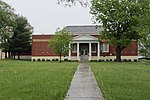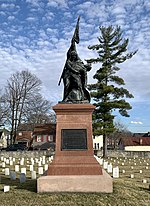Battle of Rutherford's Farm
1864 in VirginiaBattles of the American Civil War in VirginiaBattles of the Eastern Theater of the American Civil WarConflicts in 1864Frederick County in the American Civil War ... and 3 more
July 1864 eventsUnion victories of the American Civil WarValley campaigns of 1864
The Battle of Rutherford's Farm, also known as Carter's Farm and Stephenson's Depot, was a small engagement between Confederate forces under Maj. Gen. Stephen D. Ramseur and Union forces under Brig. Gen. William W. Averell on July 20, 1864, in Frederick County, Virginia, during the American Civil War, as part of Confederate Lt. Gen. Jubal Early's Valley Campaign, resulting in a Union victory. Pvt. John Shanes, Company K, 14th West Virginia Infantry, received the Medal of Honor for his actions in the fighting near Carter's Farm, where he, "charged upon a Confederate fieldpiece in advance of his comrades and by his individual exertions silenced the piece."
Excerpt from the Wikipedia article Battle of Rutherford's Farm (License: CC BY-SA 3.0, Authors).Battle of Rutherford's Farm
Martinsburg Pike,
Geographical coordinates (GPS) Address Nearby Places Show on map
Geographical coordinates (GPS)
| Latitude | Longitude |
|---|---|
| N 39.219333333333 ° | E -78.133333333333 ° |
Address
Martinsburg Pike
Martinsburg Pike
22656
Virginia, United States
Open on Google Maps








